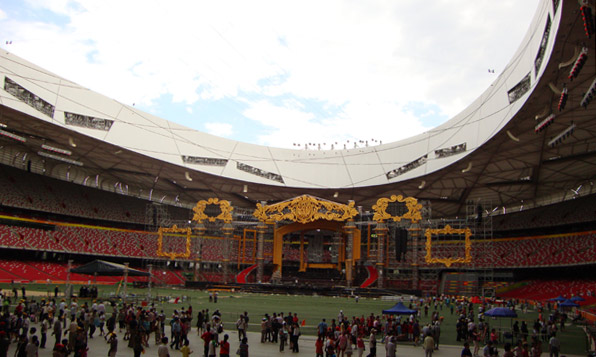By Johanna Yueh
|

|
| Inside the Bird's Nest: Visitors mill around on the field, which was partially closed off by the clean-up crew dismantling the concert stage set up for a concert the night before. [China.org.cn] |
It was a bright blue day at the Bird's Nest. Nearly a year after its grand debut at the Opening Ceremony of the 2008 Olympics, the iconic stadium remains a sight to behold. While not as tall as the skyrises that surround it just the next block over, the Bird's Nest's break from conventional Beijing architecture makes the stadium seem gargantuan. Then again, built to seat 91,000, the stadium is gargantuan. What's such a large stadium to do when its raison d'être has come and passed?
Well, for starters, it removed 11,000 seats. But the still-giant complex still has had trouble booking events. Chinese football teams won't play matches there because it would be embarrassing how many empty seats there will be. Rumors that Beijing Guo'an football club would move there have been denied, mainly because it would be almost impossible for a Chinese Super League club to raise enough money through ticket sales or sponsorship for the move.
Since October, the Bird's Nest has opened its doors to tourists, who have been providing a steady stream of business. For 50 yuan (US$7.32) each, people can enter the stadium, sit in the plastic red (or white) seats and watch nothing. Exciting? Wait until you hear about our day.
The stadium's mangle of twisted steel beams towered over visitors as they milled around outside. Thousands of visitors flock to the Bird's Nest every day. More than 3 million visitors have entered the stadium since it opened to the public last October. Most of the ones we saw were Chinese on vacation tours to Beijing, and you could tell which group each belonged to by the color of his baseball cap. They came from all over the country -- Zhejiang, Hebei, Qingdao, to name a few. Some visitors were Not Chinese, meaning they were white. They hailed from places like Texas and France.
When we arrived in the early afternoon, workers were still cleaning up the field from the concert the night before. The sunlight caught the gold confetti still floating around in the air, creating a twinkling of light and giving the illusion that something exciting, something celebratory was happening. Chinese soprano Song Zuying, international pop star Jay Chou, star pianist Lang Lang and the great tenor Placido Domingo had rocked the Bird's Nest just the night before, the first of what stadium owners hope to be an annual summer concert. The concert stage, an elaborate golden set, hadn't yet been dismantled. Most people, however, didn't seem to notice or take any particular interest in it.
Instead, people steadily streamed through the entrance gate, down the steps, onto the field, back up the steps -- pause to take a picture with the Olympic mascots, Beibei, Jingjing, Huanhuan, Yingying and Nini! -- then into the gift shop and out the exit gate. And the most interesting thing they see on this 10-minute journey? My colleague, Catherine.
Catherine is blue-eyed and blonde. Most of the visitors, being from far-flung corners of China, had never seen such a mei nü. (They've never seen the Bird's Nest, either, but then again, the building isn't very interactive.) They lined up to take pictures with her. The shier ones took pictures from afar. I suspect she made the whole trip worthwhile for them. Most people, it seemed, went just to go, just to be there. It is, after all, the centerpiece for China to mark its re-entrance into the arena of world power players.
This building encapsulates the contradiction that is China: For a country with one of the oldest continuous history that often comes across as backward to the modern world, the Bird's Nest is a surprisingly novel design -- one that was embraced by the Chinese. It takes its nickname from an expensive delicacy, yet China boasted how little it cost to build (at least, compared to what it would have cost in the West). And for Westerners, long conditioned to think of dragons and lanterns, the Bird's Nest is a symbol for China they are not used to seeing.
The stadium's owners are milking its hype for all its worth. Most visitors didn't seem to be bothered by the lack of anything to watch. Despite the 50 yuan ticket to see and do more or less nothing, the Bird's Nest continues to draw visitors because, well, it's the Bird's Nest. It's not just an architectural design wonder and delicious eye candy for Herzog and de Meuron fans, it's a proclamation that people want to hear and a history that people want to be part of.